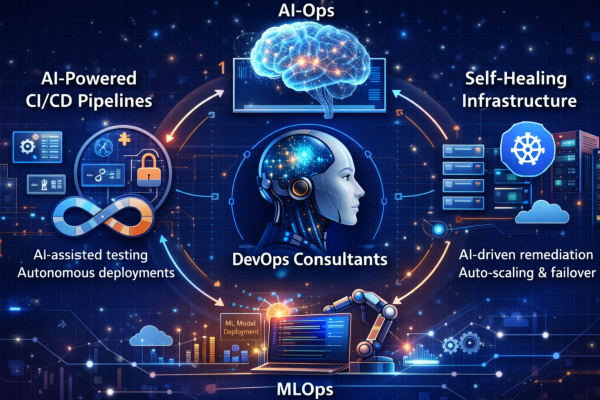How DevOps Consulting Services Use Jenkins and GitLab CI for Automation
In modern software development, speed and reliability are non-negotiable. This is why DevOps Consulting Services are in high demand. These services help companies build automated CI/CD pipelines using tools like Jenkins and GitLab CI. Unlike basic automation, consultants use these tools to construct robust systems that handle testing, deployment, infrastructure, and security—all without manual intervention.
Why DevOps Consulting Services Use Jenkins and GitLab CI
- Highly Customizable Workflows
DevOps Consulting Services prefer Jenkins and GitLab CI because both allow the creation of customized pipelines. Jenkins offers powerful scripting capabilities, while GitLab CI provides a clean YAML-based configuration system. This enables consultants to align automation processes exactly with business goals. - Tool Integrations at Scale
Jenkins supports thousands of plugins, while GitLab CI integrates natively with tools like Docker, Kubernetes, and cloud platforms. Consultants use these integrations to connect build pipelines with infrastructure, version control, testing tools, and monitoring systems—all within a single workflow. - Support for Complex Projects
These tools can handle multi-branch workflows, microservices, and multi-environment deployments. DevOps Consulting Services use them to manage enterprise-grade architectures that need scalable and intelligent automation strategies.
How DevOps Consulting Services Use Jenkins for Automation
- Automated Builds Across Multiple Languages
Consultants use Jenkins to automate builds for applications written in Java, Python, Node.js, or other languages. Every time a developer pushes code to the repository, Jenkins triggers a pipeline that compiles the code and packages it for deployment. This reduces manual build errors and ensures consistency across environments. - Integrated Automated Testing
Jenkins allows seamless integration with test automation tools like JUnit, Selenium, and TestNG. DevOps Consulting Services configure pipelines to run unit tests, integration tests, and UI tests automatically. This helps detect bugs early in the cycle, improving software quality and reducing rework. - Intelligent Deployment Workflows
Jenkins pipelines are used to automate deployment across dev, staging, and production environments. Consultants add logic to handle blue-green or canary deployments, so updates can be rolled out with zero downtime. They also include rollback procedures in case something goes wrong. - Monitoring and Alerting Integration
DevOps Consulting Services connect Jenkins pipelines with tools like Slack, Microsoft Teams, or email systems. Whenever a build fails or a deployment succeeds, teams are instantly notified. This keeps everyone updated and ensures rapid response to failures. - Automating Infrastructure with Jenkins
Jenkins is used to run Terraform, Ansible, or other infrastructure-as-code tools. Consultants build pipelines that can create or update cloud infrastructure automatically when new code is deployed, ensuring environments stay in sync with the application’s needs.
How DevOps Consulting Services Use GitLab CI for Automation
- Pipeline Defined in a Single File
GitLab CI uses a .gitlab-ci.yml file to control every part of the automation process. DevOps consultants define multiple stages—build, test, security scan, and deploy—all within this file. This centralized configuration reduces complexity and improves transparency. - Seamless Integration with Git Repositories
Because GitLab CI is built into GitLab, consultants easily configure it to trigger pipelines based on events like code push, merge requests, or tag creation. This ensures continuous feedback throughout the development lifecycle. - Containerized and Scalable Builds
DevOps Consulting Services configure GitLab Runners with Docker to ensure builds happen in isolated, consistent environments. This prevents “it works on my machine” issues and allows pipelines to run in parallel across multiple containers. - Dynamic Environment Provisioning
GitLab CI can automatically create a live environment for every merge request. Consultants use this to deploy a preview version of the app for QA or product teams to test—without impacting production or staging environments. - Built-in Security Scans
GitLab CI supports Static Application Security Testing (SAST), Dynamic Application Security Testing (DAST), and dependency scanning. DevOps consultants enable these scans to catch vulnerabilities during development, instead of after release. - Automated and Conditional Deployments
GitLab CI allows consultants to deploy code automatically to various environments, but only under specific conditions—like successful test completion or approval by a senior developer. This ensures safer deployments and reduces the risk of production failures.
Automation Use Cases Handled by DevOps Consulting Services
- Multi-Environment CI/CD Pipelines
DevOps Consulting Services create pipelines that handle deployment to development, staging, and production. Each environment can have its own approval process, configuration files, and security controls. - Parallel Testing for Faster Feedback
Consultants break down large test suites and run them in parallel using multiple agents. This drastically reduces the time it takes to validate code changes, which keeps the release cycle moving quickly. - Secure Secrets Management
Instead of hardcoding passwords or API keys, consultants configure pipelines to pull secrets from vaults like HashiCorp Vault or AWS Secrets Manager. This makes automation secure and compliant with data protection standards. - Automated Infrastructure Provisioning
Using Jenkins or GitLab CI, DevOps consultants create infrastructure-on-demand. For example, they can set up a temporary Kubernetes cluster whenever a new feature branch is pushed—then tear it down when it’s no longer needed. - Built-in Rollback Logic
Consultants write pipelines that automatically monitor deployments and roll back to the last working version if an error or threshold breach is detected. This avoids prolonged downtime and service disruption.
Benefits of Automation with DevOps Consulting Services
- Expert Design of Pipelines
Pipelines built by DevOps consultants are structured, version-controlled, and modular. They follow best practices and industry standards, ensuring scalability and maintainability over time. - Security Embedded in Every Stage
Consultants ensure every step of the pipeline—from code commit to production deployment—includes security checks, permissions, and audit trails. This minimizes vulnerabilities and supports compliance requirements. - Improved Developer Productivity
Developers don’t need to run manual tests, wait for ops teams to deploy, or troubleshoot flaky environments. With automation in place, they can focus on writing code, not managing delivery processes. - Shorter Release Cycles
With automated build, test, and deploy processes, release cycles shrink from weeks to days—or even hours. This means features reach customers faster, and bugs get fixed quickly. - High Reliability and Reduced Risk
Automation reduces the chance of human error, supports predictable outcomes, and ensures repeatable deployments—especially critical in high-availability systems.
Conclusion
DevOps Consulting Services are not just about setting up Jenkins or GitLab CI—they’re about building a smart automation strategy that supports continuous delivery, operational efficiency, and software quality.
By using Jenkins, consultants create complex, plugin-driven pipelines for organizations that need full control and deep customization. GitLab CI, on the other hand, offers a tightly integrated, Git-centric experience that simplifies configuration and speeds up pipeline setup.
Whether it’s secure deployments, dynamic environments, or end-to-end test automation, DevOps Consulting Services deliver a transformation that goes far beyond scripts and servers—they create a modern, automated backbone for software delivery.
Author







